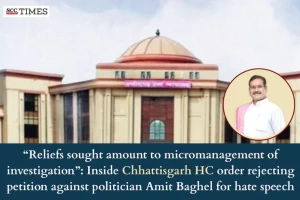Disclaimer: This has been reported after the availability of the order of the Court and not on media reports so as to give an accurate report to our readers.
Chhattisgarh High Court: In a writ petition filed against politician Amit Baghel, belonging to Johar Chhattisgarh Party, for his hate speech against, the Division Bench of Ramesh Sinha, CJ., and Bibhu Datta Guru*, J., rejected the petition, holding that the reliefs sought were neither maintainable nor substantiated by any exceptional circumstance justifying deviation from established legal principles governing criminal investigation.
Background
The petitioner filed the present writ petition of mandamus, contending that Amit Baghel has been continuously making vitriolic hate speech as well as blasphemous and derogatory remarks against the Agrawal, Sindhi, and Jain communities and their revered figures. He contended that despite several FIRs, the State had failed to take any coercive action, and such selective inaction was arbitrary and violative of Article 14 of the Constitution.
The petitioner further argued that the State’s failure to curb such targeted hate speech infringes upon the communities’ right to life with dignity under Article 21, creates an atmosphere of fear and intimidation, and directly attacks their freedom of conscience and religious rights under Article 25. He stated that the repeated acts of Amit Baghel fell under Sections 153A, 153B, 295A, and 505 of the Penal Code, 1860 (“IPC”) and posed a grave threat to communal harmony. Thus, the petitioner, having no alternative efficacious remedy due to consistent State apathy, was constrained to seek a writ of mandamus directing immediate, effective, and time-bound action to safeguard public order and uphold constitutional values.
Analysis
Upon consideration of the submissions and the material available on record, the Court noted that multiple FIRs had already been registered against Amit Baghel, and the investigations therein were stated to be ongoing. Additionally, the Court stated that the petitioner had not presented any cogent material to demonstrate that the investigating agency had either shut the investigation or refused to act on the FIRs.
“Mere dissatisfaction with the pace or nature of investigation cannot, in law, furnish a ground for invoking the extraordinary jurisdiction of this Court under Section 528 of the Bhartiya Nagarik Suraksha Sanhita, 2023 (BNSS), or Article 226 of the Constitution.”
The Court further stated that the reliefs sought by the petitioner, particularly those seeking directions for immediate arrest, the manner of investigation, supervision by a senior officer of a particular rank, and periodic status reports, amounted to a prayer for judicial supervision and micromanagement of criminal investigation. The Court remarked that such reliefs, if granted, would impermissibly encroach upon the statutory domain of the investigating agency and violate the well-settled principle that the Court cannot direct the police to arrest a particular individual, nor can it predetermine the course or outcome of an investigation.
The Court added that the Supreme Court in a catena of judgments had consistently held that while the State is obligated to register FIRs and maintain public order, Courts must refrain from issuing directions that interfere with investigative discretion unless there exists clear evidence of mala fides, deliberate inaction, or a complete failure of the machinery. In the present case, the Court stated, no material was placed on record to establish that the State authorities had acted arbitrarily, discriminatorily, or with ulterior motive.
“The mere assertion of ‘State apathy,’ without substantiating facts, is insufficient to justify judicial intervention.”
Regarding the decisions in Tehseen S. Poonawalla v. Union of India, (2018) 9 SCC 501, and Shaheen Abdulla v. Union of India1, the Court stated that though it was mindful of the directions issued by the Supreme Court in the aforementioned cases, the judgments do not mandate automatic arrests or mechanical coercive action upon every allegation of hate speech. They require the State to register FIRs and ensure fair, expeditious investigation, which, in the present case, had already been undertaken. The petitioner did not show any exceptional circumstance to indicate non-compliance with these guidelines, nor was there any imminent threat to public order warranting extraordinary measures.
The Court reiterated that a writ of mandamus cannot be issued to compel the police to submit a charge sheet or to carry out an investigation in a particular manner, as doing so would compromise the independence of investigation and the statutory protections embedded in the BNSS. Thus, the Court held that the petitioner’s prayer for consolidated supervision and consolidated charge sheet was likewise misconceived and unsupported by any statutory requirement.
Thus, the Court rejected the petition, holding that the reliefs sought were neither maintainable nor substantiated by any exceptional circumstance justifying deviation from established legal principles governing criminal investigation.
[Amit Agrawal v. State of Chhattisgarh, 2025 SCC OnLine Chh 11313, decided on 21-11-2025]
*Judgment authored by: Justice Bibhu Datta Guru
Advocates who appeared in this case:
For the petitioner: Petitioner in Person
For the respondent: Deputy Government Advocate Shaleen Singh Baghel
Buy Penal Code, 1860 HERE
Buy Constitution of India HERE
1. WPC No.940 of 2022


